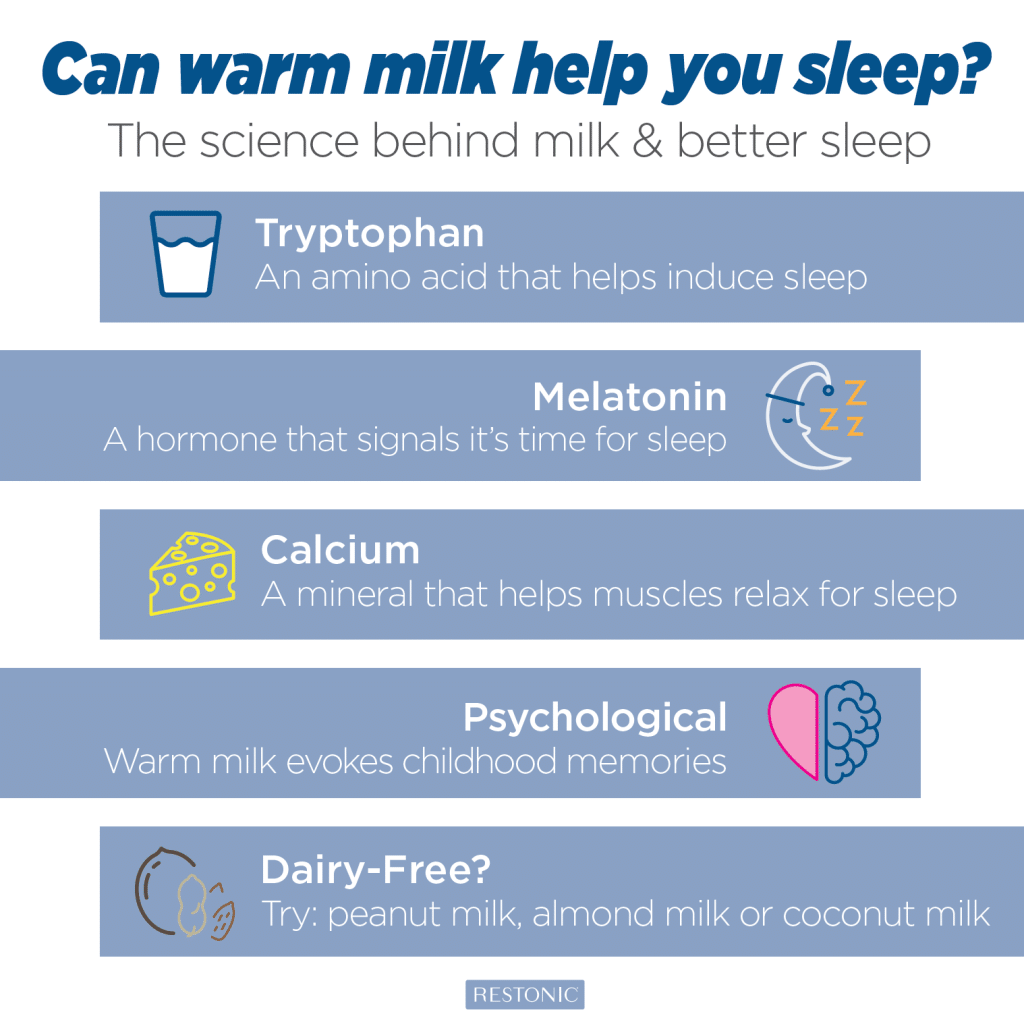Picture this: you’re lying in bed, tossing and turning, unable to fall asleep. You’ve tried counting sheep, reading a book, and even meditating, but nothing seems to do the trick. Out of sheer desperation, you remember your grandmother’s old remedy: drinking warm milk before bed. But does this age-old tradition truly hold the key to a peaceful slumber? In this article, we’ll explore whether or not drinking warm milk before bed can actually help you sleep. So grab a cup of cocoa (or warm milk if you prefer), get cozy, and let’s find out together.
Review contents
Possible Benefits of Warm Milk for Sleep
Promotes Relaxation
One of the possible benefits of drinking warm milk before bed is that it promotes relaxation. Many people find warm milk comforting and soothing, which can help to calm the mind and prepare the body for a restful night’s sleep. The warmth and creamy texture of milk can create a sense of coziness, making it easier to unwind and relax before bedtime.
Contains Tryptophan
Warm milk also contains an amino acid called tryptophan, which is known for its potential sleep-inducing effects. Tryptophan is a precursor to serotonin, a neurotransmitter that plays a key role in regulating sleep and mood. Consuming foods rich in tryptophan, such as warm milk, may help to increase the levels of serotonin in the brain, promoting a sense of calm and aiding in sleep.
Boosts Serotonin Levels
In addition to containing tryptophan, warm milk can help boost serotonin levels indirectly. Milk is a source of calcium, which is necessary for the production of serotonin. Calcium triggers the release of certain neurotransmitters in the brain, including serotonin. By consuming warm milk before bed, you may be providing your body with the necessary nutrients to support optimal serotonin levels, thus enhancing sleep quality.
Does Warm Milk Actually Help You Sleep Better?
Conflicting Studies
While warm milk has long been considered a bedtime remedy to promote sleep, studies on its effectiveness have yielded conflicting results. Some studies suggest that warm milk can indeed improve sleep quality, while others have found no significant difference in sleep quality between those who consume warm milk before bed and those who do not.
Individual Variations
It’s important to note that individual variations may play a role in how warm milk affects sleep. What works for one person may not work for another, as each person’s body chemistry and response to certain foods or drinks is unique. While warm milk may be beneficial for some individuals in promoting sleep, others may find different methods more effective. It’s always best to experiment and listen to your own body to determine what works best for you.
Placebo Effect
Another factor to consider is the potential placebo effect of warm milk. The belief or expectation that warm milk will help you sleep better can create a psychological effect that actually improves sleep. If you strongly associate warm milk with relaxation and sleep, the act of drinking it before bed may signal to your brain that it’s time to wind down and prepare for sleep, thus aiding in the transition to a more restful slumber.
This image is property of restonic.com.
Other Factors Affecting Sleep
Sleep Environment
While warm milk may have some potential benefits for sleep, it’s important to remember that it is just one piece of the puzzle when it comes to achieving quality sleep. The overall sleep environment plays a significant role in sleep quality as well. Factors such as noise levels, temperature, lighting, and comfort of your mattress and pillows can greatly impact your ability to fall asleep and stay asleep throughout the night.
Bedtime Routine
Establishing a consistent bedtime routine can also contribute to better sleep. Engaging in relaxing activities such as reading a book, practicing gentle stretching or yoga, taking a warm bath, or listening to calming music can help signal to your body that it’s time to unwind and prepare for sleep. Incorporating warm milk into your bedtime routine can be a soothing ritual that further enhances relaxation before bed.
Stress and Anxiety
Stress and anxiety are common factors that can disrupt sleep. If you find yourself feeling stressed or anxious before bed, warm milk alone may not be enough to alleviate these feelings. It may be beneficial to explore other stress management techniques such as meditation, deep breathing exercises, or journaling to help calm your mind and promote a more restful state before sleep.
Alternatives to Warm Milk for Better Sleep
Herbal Teas
If warm milk doesn’t appeal to you or if you are lactose intolerant, herbal teas can be a great alternative for promoting sleep. Certain herbal teas, such as chamomile or lavender, have natural calming properties that can relax the body and mind. Sipping on a warm cup of herbal tea before bed can create a similar sense of relaxation and prepare you for a good night’s sleep.
Magnesium Supplements
Magnesium is an essential mineral that plays a crucial role in sleep regulation. It helps to relax the muscles and calm the nervous system, promoting a state of relaxation. If you prefer not to consume warm milk or herbal teas, taking a magnesium supplement before bed may be beneficial in improving sleep quality.
Relaxation Techniques
Engaging in relaxation techniques such as progressive muscle relaxation, guided imagery, or meditation can help prepare your body and mind for sleep. These techniques can be practiced in combination with warm milk or as an alternative method for promoting relaxation and better sleep.
This image is property of www.medindia.net.
Best Time to Drink Warm Milk for Sleep
About 30 Minutes Before Bed
For those who find warm milk helpful in promoting sleep, it is generally recommended to consume it approximately 30 minutes before bed. This allows enough time for the body to absorb the nutrients and for the warmth and comfort of the milk to take effect. Drinking warm milk too close to bedtime may lead to discomfort and disrupt the onset of sleep.
Avoid Digestive Discomfort
To ensure optimal comfort and avoid digestive discomfort, it’s best to choose a low-fat or skim milk option rather than full-fat milk. High-fat milk can be heavier on the stomach and may cause indigestion or discomfort during sleep. Experimenting with different types of milk, such as almond milk or soy milk, can also be a viable option for those with lactose intolerance or milk allergies.
Tips for Enhancing the Sleep-Promoting Effects
Combine with Spices or Herbs
To enhance the sleep-promoting effects of warm milk, consider adding spices or herbs known for their relaxation properties. Cinnamon, nutmeg, or a dash of herbal honey can add a touch of flavor and extra relaxation benefits. These additions can further enhance the soothing and calming effect of warm milk, making it even more effective in helping you drift off to sleep.
Avoid High-Fat Milk
As mentioned earlier, opting for low-fat or skim milk can be beneficial to avoid digestive discomfort. High-fat milk can be harder to digest, potentially leading to indigestion, heartburn, or disrupted sleep. Choosing a lighter milk option can help ensure that the sleep-promoting effects of warm milk are not overshadowed by discomfort or digestive issues.
Consider Bedtime Snack Options
Warm milk can also be enjoyed as part of a bedtime snack. Incorporating healthy and sleep-friendly snacks such as a small portion of whole-grain crackers, a banana, or a handful of nuts can provide some additional nutrients and promote feelings of fullness, which may aid in promoting a more restful sleep.
This image is property of qph.cf2.quoracdn.net.
Potential Risks or Side Effects
Lactose Intolerance
One potential risk of consuming warm milk before bed is if you have lactose intolerance. Lactose intolerance is the inability to fully digest lactose, the sugar found in milk and other dairy products. This can lead to symptoms such as bloating, gas, diarrhea, and abdominal discomfort. If you are lactose intolerant, it’s recommended to choose lactose-free options such as lactose-free milk or alternative milk options to avoid these potential side effects.
Weight Gain
While warm milk itself is not likely to cause weight gain, it’s important to be mindful of overall calorie intake. If you regularly consume warm milk as part of a bedtime routine and it adds excessive calories to your diet, it could contribute to weight gain over time. Moderation is key, and it may be beneficial to consult with a healthcare professional or registered dietitian to ensure that your overall diet is balanced and appropriate for your individual needs and goals.
Sleep Disruption
In rare cases, warm milk may cause sleep disruption for certain individuals. Some people may be more sensitive to the lactose or proteins found in milk, which can lead to digestive discomfort, gas, or even a nighttime need to use the bathroom. If you experience any sleep disturbances or discomfort after consuming warm milk, it may be best to discontinue the practice and explore alternative methods for improving sleep.
Conclusion
When it comes to improving sleep, individual preferences and responses can greatly vary. While warm milk has been a popular bedtime remedy for many years, its effectiveness may vary from person to person. It is important to consider other factors affecting sleep, such as sleep environment, bedtime routine, and stress levels. If warm milk doesn’t work for you, there are alternative options including herbal teas, magnesium supplements, and relaxation techniques. Experimentation and a willingness to try different methods may be necessary to find what works best for you. Always listen to your body and consult with a healthcare professional if you have any concerns or specific dietary restrictions. Remember, a good night’s sleep is essential for overall health and well-being, and finding the right sleep-promoting routine can greatly contribute to a better quality of life.
This image is property of www.sleepadvisor.org.






























